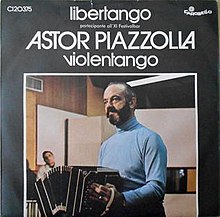music.wikisort.org - Composition
Libertango is a composition by tango composer and bandoneon player Astor Piazzolla, recorded and published in 1974 in Milan. The title is a portmanteau merging "Libertad" (Spanish for "liberty") and "tango", symbolizing Piazzolla's break from classical tango to tango nuevo.
| "Libertango" | |
|---|---|
 | |
| Single by Astor Piazzolla | |
| from the album Libertango | |
| Released | 1983 |
| Recorded | Milan, Italy |
| Genre | Tango nuevo |
| Length | 2:49 |
| Label | Carosello |
| Songwriter(s) | Astor Piazzolla |
Performances
Astor Piazzolla recorded and published Libertango in 1974 in Milan, symbolizing his break from classical tango to tango nuevo[1] (see below for recording details).
Cellist YoYo Ma played Libertango on his 1997 album Soul of the Tango: The Music of Astor Piazzolla.
It was featured by guitarist Al Di Meola in his 2000 album The Grande Passion.
In 2002 Libertango appeared on Australian/British classical crossover string quartet Bond second album Shine.
In 2013 Libertango appeared on award-winning album Surreal by guitar-virtuoso Roman Miroshnichenko.
In 2017, it appeared on the collaborative live album by the Japanese jazz pianist Hiromi and the Colombian harpist Edmar Castaneda, recorded in Montreal.
Derivatives
Although Libertango was born as an instrumental piece, in 1990 Uruguayan poet Horacio Ferrer added lyrics in Spanish language based on the theme of freedom.
According to the performance database at All Music Guide, the composition has appeared on over 500 separate releases.[2] Grace Jones's song I've Seen That Face Before (Libertango) uses the same music, as does Jazz Mandolin Project's song "Jungle Tango", Guy Marchand's song "Moi je suis tango" and Kati Kovács's song Hívlak.
In 1997 Irish folk musician Sharon Shannon recorded a cover of Grace Jones' I've Seen That Face Before (Libertango) for her third album, Each Little Thing.[3] Featuring session vocals by Kirsty MacColl it also appeared in 2001 on The One and Only, a compilation album released after her death.[4] Shannon re-released the recording as the title track of her 2005 compilation.[5]
Cuban-American singer/composer Luisa Maria Güell added lyrics in the theme of the "Libertango" title and recorded it for her 2007 album Una. A more recent version in Spanish of Libertango lyrics belongs to the Argentinian singer, lyricist and composer Lilí Gardés, who describes the loneliness of city life. This version was approved by Edizione Cursi/Pagani SRL, and it was part of the show Zombitango.
Media
In the Prince of Tennis anime series, Atobe Keigo and Sanada Genichirou attended a performance of this song. They used it later to set the beat for their Doubles match. In the fandom these characters are known as the "Tango Pair".
Libertango was the backing music in the Tarot advert for Volvo's S60 compact executive saloon.[6]
The music was used in the Roman Polanski movie Frantic (1988), as well as in Jacques Rivette's film Le Pont du Nord (1981).
1974 performance

- Astor Piazzolla - bandoneón, arranger, conductor
- Felice Da Viá - piano, Hammond organ C3
- Gianni Zilioli - Hammond organ C3, marimba
- Giuseppe Prestipino (Pino Presti) - bass guitar
- Tullio De Piscopo - drums, percussions
- Filippo Daccò - acoustic and electric guitar
- Andrea Poggi - timpani, percussions
- String section with
- Umberto Benedetti Michelangeli - 1st violin
- Elsa Parravicini - 1st viola
- Paolo Salvi - 1st cello
- Marlaena Kessick - G flute
- Hugo Heredia, Gianni Bedori - C flute
Recorded in May 1974 at Mondial Sound Studio, Milan (Italy)
Sound engineer: Tonino Paolillo
References
- See Azzi and Collier, Le Grand Tango: The Life and Music of Ástor Piazzolla, Oxford University Press, 2000, p. 168.
- Performance Listing for "Libertango" at All Music Guide.
- Each Little Thing at All Music Guide.
- The One and Only at All Music Guide.
- Libertango at All Music Guide.
- Video from Volvo's YouTube channel.
External links
- Astor Piazzolla original 1974 performance (audio only)
- Video of Nestor Marconi playing libertango with Yo-Yo Ma
- Libertango Music Video of Luisa Maria Güell from her album Una, 2007, lyrics by L. M. Güell
На других языках
- [en] Libertango
[es] Libertango
Libertango es tanto un disco como un tema del compositor y músico de tango argentino Astor Piazzolla, publicado por primera vez en 1974 en Milán, y reversionado por muchos artistas diferentes. Su título es una palabra compuesta por los términos "libertad" y "tango", presumiblemente como bandera de la libertad creativa que buscaba Piazzolla al crear el llamado tango nuevo, a diferencia del tango clásico.[ru] Libertango
Libertango (рус. либертанго) — композиция в стиле новое танго композитора Астора Пьяццоллы, записанная и изданная в 1974 году в Милане. Название дано от слияния слов «свобода» (исп. libertad) и «танго» (символизирует переход Пьяццоллы от классического танго в танго нуэво)Другой контент может иметь иную лицензию. Перед использованием материалов сайта WikiSort.org внимательно изучите правила лицензирования конкретных элементов наполнения сайта.
WikiSort.org - проект по пересортировке и дополнению контента Википедии